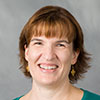Back in the fall I got a mysterious invitation in my inbox to a conference called “Social Science FOO Camp” taking place at Meta in Menlo Park, CA. I was a bit mystified but intrigued and when I looked into it a bit more, it turns out it was co-hosted by SAGE Publishing and that was the source of my invitation. SAGE, together with O’Riley, The Arthur P. Sloan Foundation, and Meta host Science FOO and SS FOO camps. SS FOO brings together about 250 people from around the world and across the social sciences to talk about what they are working on, what problems they want to solve, and what they think is coming down the pike.
Flash forward to this past weekend and I spent two days in one of the most intense but fascinating conferences I have ever experienced. Can something be both energizing and exhausting? Well yes. Yes it can. It’s run as an unconference which means on the first night people proposed discussions on a wide variety of topics over the meeting session times and then a schedule was created by the next morning. Nothing was formal – no formal presentations (other than a few lightning talk sessions where people talked about things for 5 minutes each) – all the sessions were just discussions.
Attendees range from PhD students to Nobel Prize winners, with academics, researchers, policy people, technology folks, computer scientists and everything in between. So truly an eclectic group of REALLY REALLY smart and interesting people. I was the only librarian there (I think) but heard from more than one person that they hoped more would be included in the future.
There is a general agreement among participants in this event that we won’t live blog it or write detailed descriptions of sessions or research that was discussed because lots of them are works-in-progress (they called this a FrieNDA). But to give you a sense of the broad range of topics I either talked to folks about at meals or in sessions here is a sampling:
- Chat GPT and other forms of Generative AI (like DALL-E) – this was the shadow over the whole conference – it got brought up in a myriad of ways – not all bad. What will it create? What will it destroy? What will it mean long-term? What do we need to be studying about it? How do we gather data about it?
- Climate Change misinformation
- Why social scientists need to be talking about Ukraine
- Social Media Political Influencers are here – are we ready for their impact on elections?
- Moving beyond the term disinformation (FIMI is an emerging term meaning Foreign Interference and Manipulation of Information)
- Will libraries exist in the future
- How Large Language Models (LLMs) are biased but how that bias is something we need to be studying so we don’t necessarily want all of the bias removed
- How the international visa system is not keeping up with international remote work needs for companies or workers
- How the loss of the Twitter API (Musk canned it during the conference) is going to stop a lot of social media research projects dead in their tracks
- What institutions need to be doing to help their researchers prepare for online harassment when they research topics that have troll armies attacking them. Should this be included in workplace safety discussions, for example?
- What is the balance between individual responsibility and corporate responsibility in the uptake of mis/disinformation
- Why science needs humanists and humanists need scientists (talked a lot about the last mile problem)
- Algorithms, algorithms, algorithms
- Trust and safety issues from all sides (whose trust are tech companies trying to gain, whose safety are they trying to protect?)
- How we can use art to bring technology issues to light in really interesting ways.
There were more things, books and articles to read, and stuff I’m going to be marinating on for a while, but by far my biggest takeaway is when you get smart people together outside of the confines of their silos and their institutions, a real energy starts to be created around what is possible. These are smart people thinking deeply about some of the biggest issues that we face as a planet and they are committed to finding ethical ways of addressing them. And that gave me some real hope. I don’t know that I’ll be invited back next year or if I’ll go if I am, but it was a great experience.

6 Comments on ‘Roz at Social Science FOO Camp 2023’
That sounds sooooo cool!
That sounds super fun and interesting! I really hope, “will libraries exist in the future?” was not taken seriously as a question, though! Haha.
Thanks for sharing, Roz, especially the optimism!
I’m liking this change from disinformation to Foreign Interference and Manipulation of Information. It is more exact and active…identifying the culprits! I thought the whole conference might be on the balance between individual responsibility and corporate responsibility on the uptake of misinformation. It must have been interesting with Meta in the room. (Was Meta in the room?) What a fascinating conference. I am glad you got to go.
Agree, Amanda! Seems like a better question is how people will get information in the future, anyway. Sounds like a fun and mysterious adventure, Roz, always cool to be able to think interdisciplinarily!
What a great topic list! I like “FIMI” too! (we’ve come a long way from “fake news!”)